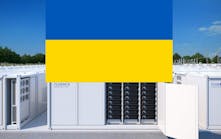GKN Hydrogen, SoCalGas work with National Renewable Lab to deploy Green H2 Storage
Hydrogen storage solutions firm GKN Hydrogen and utility Southern California Gas Co. (SoCalGas) are working with the U.S. Department of Energy’s National Renewable Energy Laboratory on the deployment of a green hydrogen storage solution at NREL's Flatirons Campus in Boulder, Colorado.
Two HY2MEGA storage vessels will be connected to an electrolyzer and fuel cell at the ARIES facility on the Flatirons Campus. The electrolyzer will produce green hydrogen from renewable sources and this energy will be stored in the HY2MEGA system in solid state under low pressure.
GKN Hydrogen claims that this is the safest way to store hydrogen. The fuel cell will convert the green hydrogen to renewable electricity.
The two HY2MEGA subsystems will add 500 kgs of storage to the site. This three-year project has received a $1.7 million funding from the DOE and $400,000 of Research, Development, and Demonstration funding from SoCalGas.
“SoCalGas will leverage the large-scale hydrogen storage capabilities of GKN Hydrogen’s HY2MEGA from this project to help accelerate the commercialization and deployment of green hydrogen projects,” said Neil Navin, Vice President of clean energy innovations at SoCalGas. “Ultimately, green hydrogen generation and storage will help decarbonize the energy system while assuring stability of the electrical grid to enable even higher penetrations of renewable sources of electricity."
Earlier this year, SoCalGas announced a proposal to develop the Angeles Link, what it called the nation’s potentially largest green hydrogen infrastructure system. The utility wants to build a 10-20 GW electrolyzer powered by up to 35 GW in wind and solar energy.
In addition, some 2 GW of energy storage capacity would store and then transport the green hydrogen to H2 offtakers in the Los Angeles Basin, according to the plan.
Hydrogen does not emit carbon dioxide when combusted. If utilized in the transportation sector, SoCalGas said, it could displace up to three million gallons of diesel fuel per day by replacing those heavy duty trucks with H2 Fuel Cell trucks.





